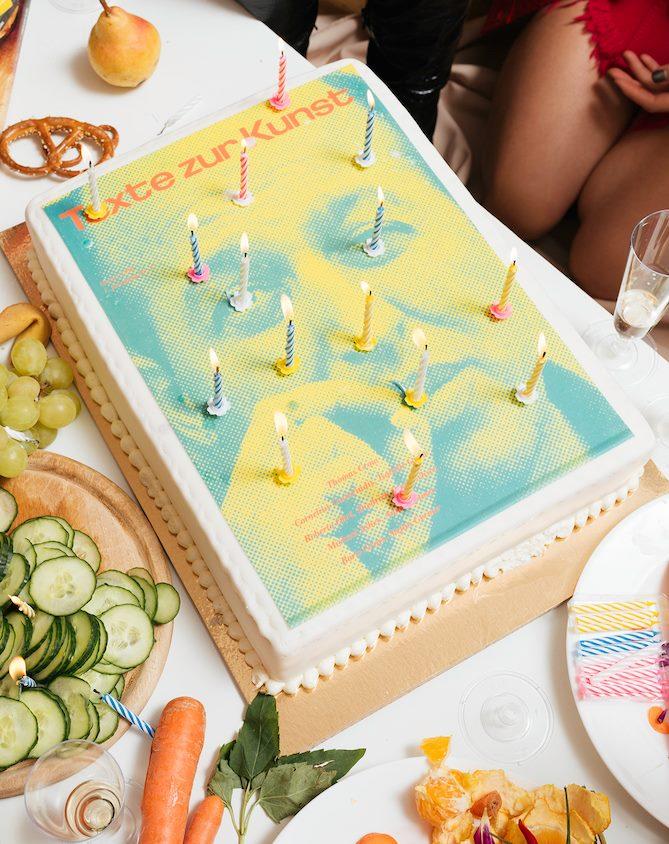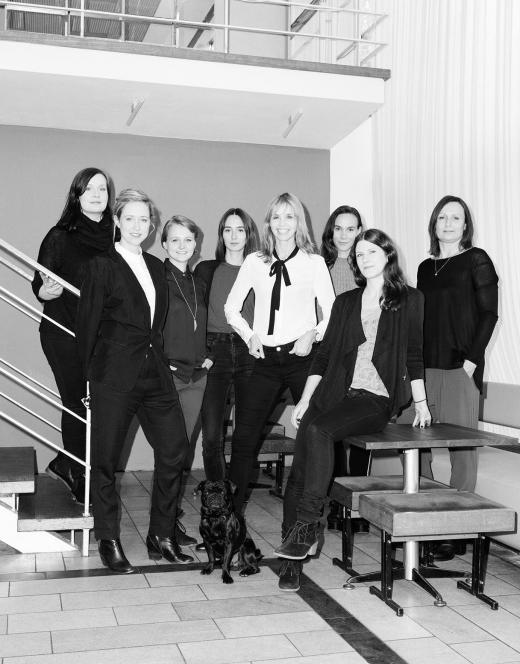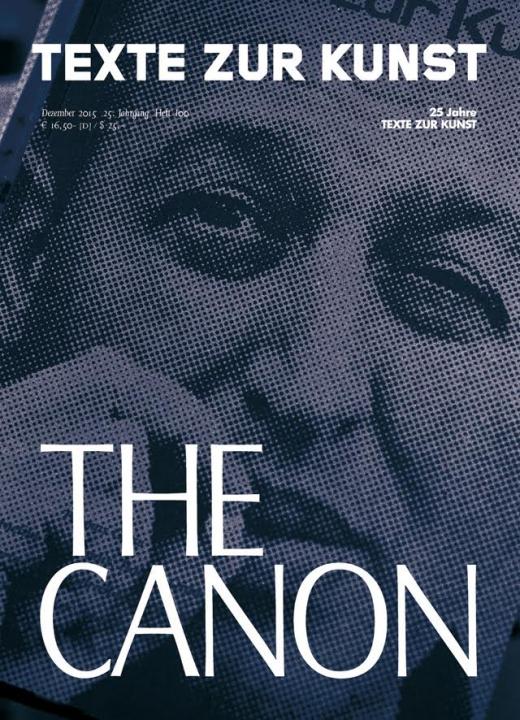Happy 25th, Texte zur Kunst!
Happy 25th, Texte zur Kunst!

Quarterly magazine Texte zur Kunst celebrates this Friday a quarter of a century. 25 years of politically and theoretically driven art criticism will be marked with “Canon Today”, a gala conference to be held on November 27 at the Haus der Berliner Festspiele, with 25 writers, artists, and theorists from different generations participating. Through various forms of performances, dialogues, and short talks, they will argue for that which they each take to be canonical as well as the processes of canonization generated from the beginning of TzK until today.
In anticipation of this grand festive get-together, we met up with the editor-in-chief Caroline Busta to get a preview of what the conference and the big 100th issue will be about.
Congratulations! 25 years is quite an impressive age for a magazine. For starters - tell us about the very beginnings, the initial concept, and the major changes that occured over the past years.
Texte zur Kunst was started in 1990 in Köln by Isabelle Graw, and Stefan Germer who passed away in 1996. It was started at a time when a lot of magazines were beginning; think of Purple and other small magazines that were dealing with culture and fashion. It was very important for TzK to advance a new kind of discourse about art. A lot of things were changing in terms of art theory at the time. In the States you had the AIDS crisis, here you had reunification. You had a lot of dynamics which were shifting, and there was still an old discourse that was being applied to art. So, the energy behind TzK was to create something that went against that prevailing canon at the time. Think of Greenberg who was on our first cover.
So, the magazine was begun by Isabelle and Stefan, plus a very intense community around this Köln / Düsseldorf axis of artists and curators. In the mid to late nineties, galleries started moving to Berlin; the Berlin art scene became filled with a lot of energy. In 2000 TzK moved its office from Köln to Berlin. Another change that might be notes was the journal’s decision to begin publishing its feature content both in German and in English. This happened in 2006, and engendered a much stronger international correspondence. Many German artists were living between New York and other parts of Europe at that time, and this discourse was now available in two languages, bridging the space between these two language areas. Now there is a true commitment to international audience. I joined the magazine as essentially a non-German speaker but am learning!

Photo: Christian Werner
Who makes the TzK team at the moment?
There are two editors, Hanna Magauer and me. As for editorial direction, our Isabelle, who is also publisher is very involved and there is also an advisory board of about 15 members, many of whom have been involved with the magazine from the very beginning, which is something not that common! Usually you have an editorial voice that switches over every few years, and in this case you have this core set of artists, musician, and theorists, and other thinkers who are a part of this core, and it gives a strong sense of continuity, bridging 1990 with now.
Why "Canon Today" as the theme for the 25th anniversary / 100th issue and the conference?
This magazine started as a countercanonical effort. It wanted to push against the canon; to show how there were ideas outside of the standard canon that were also viable. After 25 years of doing that, we are asking have we perhaps changed what one can consider a canon to be? And, after 25 years of pushing up against those standards, have we not also normalized some of the counter-canonical efforts? If you are continuously insisting on some antagonistic force, then doesn't that antagonistic force become dominant? If you are constantly trying to have a revolutionary avant-garde spirit, and you maintain that, at some point does that spirit then become normalized? Indeed, a lot of the artists that we consider very close to the magazine have become artists that even the standard canon might now consider canonical. One can't really assign good or bad to this, but one wonders what role this journal has played in creating a new canon, and is that something to embrace in a positive way? Is it something to now revise and change our position in things? A second reason, we feel ‘the canon’ was an interesting theme to explore: in 1990, when this journal began, you still had this idea of East and West, communist and not, and you still had these kinds of binaries that one could stand against. But then if one takes a current picture of global politics, and Syria could certainly be one good example for this... Nobody is certain anymore, it would seem, exactly where anyone stands; what with all the different sides and forces and alliances; With Syria, it's not like one can simply choose one side or the other. It's a very complex situation. In a way, I think our generation and younger generations take it for granted, there is always a plurality of canons that are going forward with equal measure, there is not such a sense of any one dominating. There is not just one story of “art since 1990”, at least not in the way one might draw a clear path for “art since 1900.” There is such a total plurality of different canonical trajectories that are now active. The provocation, with choosing “the canon” in this case is – how could you possibly say that there is the canon, making it a singular entity; that's impossible. That said, isn't there also a need — in order to make sense of our experience — to try to aggregate certain ideas, values and structures, and try to make some sense of it? The canon serves not just the normativizing purpose, but also one that can be generative. It creates some kind of stable ground for you then to react against. For all of these reasons – the fact that this canonizing function goes against or challenges the magazine's initial mission, the question whether a dominant canon today is even possible, and the idea that there is a responsibility of any strong discourse to provide something we can then push up against – we have chosen the canon for our anniversary.
What can we expect at the conference?
Many who are close to Texte zur Kunst, including several advisory board members will be speaking; the core of this event does come from the people who are closest to this magazine. But we have also asked people who connect us to different conversations outside of our immediate vision that we are also interested in. We have younger artists, speakers coming from overseas, and those who have been involved in the magazine in all different kinds of capacities. There is also a bit of a joke in creating this so called gala conference. The identity of TzK is "texts, about art“, is that we have established a reputation for producing high caliber, serious, long symposia and conferences. And this will be, while still very high level, much more like a piece of theater. Very short presentations, there is a lot of energy behind each one. Ranging from Michaela Meise singing a song, to Kim Gordon and Jutta Koether doing sort of mix media performance presentation, to Peter Geimer giving a more formal talk, to artists like Anne Imhof presenting more a more performative lecture. It's really like a variety show, or a cabaret. It's a gala conference, it's not just a straight conference.
The issue and the performance on Friday have different content. There is some very slight overlap in themes and some of the speakers have also written for the issue but they are two very different gestures.
And after the party is the afterparty?
Yes, starting at 10pm there is a really amazing line-up of DJ’s on stage at the Festpiele. And then after the after party… ?

What would be the next major step for TzK? Considering the growing dominance of digital media, do you have any fears or doubts about the future of the printed issue? Any back-up plans?
We come out only four times a year. Unlike a lot of art magazines that aim to create broad coverage, and totally who are maybe more focused on highlighting which artists that are cool right now, or all the biennials you should be paying attention to right now, this has never been our aim. We have always instead hoped to cultivate a conversation around certain topics that we find pressing, and then to concentrate or to aggregate a number of different opinions, sometimes conflicting, around a topic. It's a kind of reading that really does benefit from the print form. But, we do acknowledge that it is much easier to transmit information digitally, so with this issue we will start making the entire issue available as a downloadable file.
In terms of print media going forward – the art world is strange in this way. Maybe it is on a delay, but even in Berlin alone where you have such a richness of print media culture right now – Monopol, Spike, frieze de, Blau, Starship... It is not really a concern. It still makes sense to publishers, there is still a readership, there is still a desire, there are still questions to be asked and answered in this print format, so it's not something scary. Part of it is because we are funded primarily by the sales of artist editions, so we are not reliant on circulation. If that is still going, and if our readership is still there, it's fine.
: : : : :
Texte zur Kunst Gala Conference: "Canon Today"
25 YEARS - 25 INTERVENTIONS - PARTY
Friday 27/11 @ Haus der Berliner Festpiele, Berlin
Gala Conference: 14h - 20h
Party: 22h
Speakers: Daniel Birnbaum, Hannah Black, Sabeth Buchmann, Caroline Busta, Amy Lien & Enzo Camacho, Alexander García Düttmann, Helmut Draxler, Paul Feigelfeld, Peter Geimer, Jutta Koether & Kim Gordon, Karl Holmqvist, Anne Imhof, Gertrud Koch, Susanne Leeb, Dirk von Lowtzow, Michaela Meise, Matthias Mühling, Georgie Nettell, Avery Singer, Kerstin Stakemeier, Emily Sundblad, Juliane Rebentisch, Brigitte Weingart // moderated by: Andreas Beyer
The conference will be held in English.
PARTY onstage at the Berliner Festspiele from 22h
Organized by Dan DeNorch, featuring:
Eric D. Clark
Pandora's Jukebox
Justus Köhncke
KABLAM
Bianca Heuser